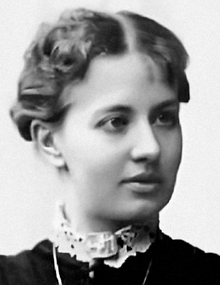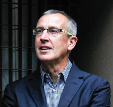Sofia Kovalevskaya (b. Moscow, 1850, d. Stockholm, 1891) was born a century ahead of her time.
But neither this nor her early death prevented her contributions to mathematics from being seminal. The best known of them is the Cauchy – Kovalevskaya theorem. She was a disciple of the great Karl Weierstrass (1815-1897), with whom she studied and brilliantly, surprisingly, completed the research undertaken by French mathematician Augustin L. Cauchy (1789 – 1857). The theorem named after them explains that the equations which describe the chief phenomena of nature – those governing materials and fluids – have soft solutions that can be calculated, though the help of computers is required in most cases. It explains the orderly flow of a shallow river and the measured movement of clouds in mild weather conditions.

Subsequently, Hans Lewy (1904 – 1988) constructed mathematical models in which everything was singular and explosive: a sort of fractal minefield. They explain that nature is not always harmonious but can surprise us with earthquakes, hurricanes and tsunamis. Moreover, Lewy’s construct took no account of the pernicious effect of human beings on imbalances on our planet (climate change, pollution, the destruction of non-renewable resources, etc.), which makes his turbulent models still more credible.
We mathematicians have striven ever since to distinguish between scenarios in which smooth, regular behaviour can be predicted and those in which we can expect a catastrophe. And there is still a long way to go before we complete that task.
The continued current relevance of Sofia’s work has unarguably earned her a place at the top table with the leading women scientists of all time. She was the first woman to hold a university chair in Europe, at the then recently founded Stockholm University. Back then, the Scandinavian countries were already example-setters in terms of social models, just as they are today in the field of technological innovation. On arriving in Stockholm she changed her name to Sonia. Like many others before her, she was looking to start afresh, to be herself and encroach on freedoms that were then accessible only to men. To quote the lyrics of Edith Piaf’s famous No Regrets, “Both the good and the bad/ I have flung in the fire/ And I feel in my heart/ That the seed has been sown[1]”. Sofia, Sonia, also took up literature with some success. Many of those around her were disconcerted at her twin creative output as a mathematician and a writer, to which she is quoted as replying “…the poet has only to perceive that which others do not perceive, to look deeper than others look. And the mathematician must do the same thing”.
As mathematicians, we try to follow in her wake and look farther and deeper, even if we almost always do so with less success than she did. This is why we have a reputation for being somewhat taciturn. We are often said to seem deaf, even though specialists can find nothing wrong with our hearing.
From time to time, however, we raise our periscopes to take a look at what is going on in our society and on our streets. I was doing just that a few days ago when I thought of Edith Piaf singing rien de rien, rendered in English as “no regrets”, though this is not an accurate translation of the French original, which means “nothing at all”
Or perhaps, given the times in which we live, it would be more appropriate to think in terms of “100% de nada”, i.e. “100% of nothing”, to quote Argentine singer Andrés Calamaro: in just a few decades we have turned from a society thrilled to be embarking on shared projects into one whose mantra is “every man for himself” and everyone seems to be after their own one hundred percent of nothing at all. We can all gain a little if we are willing to lose a little, but if we all set out to grab everything we will only end up losing it all. One hundred per cent of nothing.
Right now, after several years of economic crisis, no-one is talking about green shoots any more. Perhaps we have realised that the same trees will never come back into flower and that our society and our economy need different formulae with which to forge a future.
According to a recent news story, ten thousand young people moved away from the Basque Country last year. How can such a small country afford to lose that much young blood?
In our alarm, and with still no green shoots in sight, we have begun to glimpse a few dim lights pointing the way to new, encouraging schemes to help young people to set up their own businesses, funded by investors willing to take risks to promote new ideas in exchange for a share in the profits if those businesses are successful. This opens up an interesting path: Sofia had to break the rules of her time, like many other young nihilists who did not hesitate to enter into marriages of convenience with like-minded men in order to gain their freedom, emancipate themselves from their own families and thus manage to continue their studies and make careers for themselves.
The young of today still need nihilism, once they have broken the chains that formerly led to older generations assuring the future of younger ones. Sofia, Sonia, “the Princess of Science”, as she became known in Stockholm, won the Prix Bordin award from the Academy of Science in Paris in 1888 for her work “On the Rotation of a Solid Body about a Fixed Point[2]”. A spinning top proved to be an object deserving of her deep mathematician’s and writer’s gaze.
The spinning top of the Basque Country gyrates on and on but stands always at the same point. Some say that times of crisis provide fertile ground for qualitative leaps forward, but many believe that the sequence is just the opposite. Now is the time to find new formulae.

One of the keys of nihilism was its support for the importance of education and science. Here, as almost always seems to happen, we are arguing over the umpteenth change in the laws on education and over the use of Basque and Spanish in the classroom. These are certainly important matters, but perhaps we should ask ourselves first and foremost how we can help our young people not to feel defenceless in a market where career opportunities are few and far between. Everything seems to hinge on radical support for entrepreneurial learning, with the unnoticed quest for “one hundred per cent of nothing” being buried once and for all.
As a child Sofia, Sonia, grew tired of having only one wall of her bedroom papered and so covered the rest with prints from the lessons of Mikhail Ostrogradsky (1801 – 1862) on differential and integral calculus that her father had bought. For many years she looked at them in the belief that she did not comprehend them, only to dazzle us all later with her profound understanding.
Perhaps it is time to do as Sofia taught us and look deeper. Careful
observation of the bare walls that currently surround us should spark
spontaneous, innovative responses in us.
[1] The
original French lyric “Avec mes souvenirs j’ai allumé le feu/ Mes chagrins, mes plaisirs/
Je n’ai plus besoin d’eux” translates literally as “With my memories I have lit the fire/ My
regrets, my pleasures/ I no longer have need of them.”
[2] “Mémoire sur un cas particulier du problème de la rotation d’un corps pesant autour d’un point fixe, où l’intégration s’effectue à l’aide des fonctions ultraelliptiques du temps”
